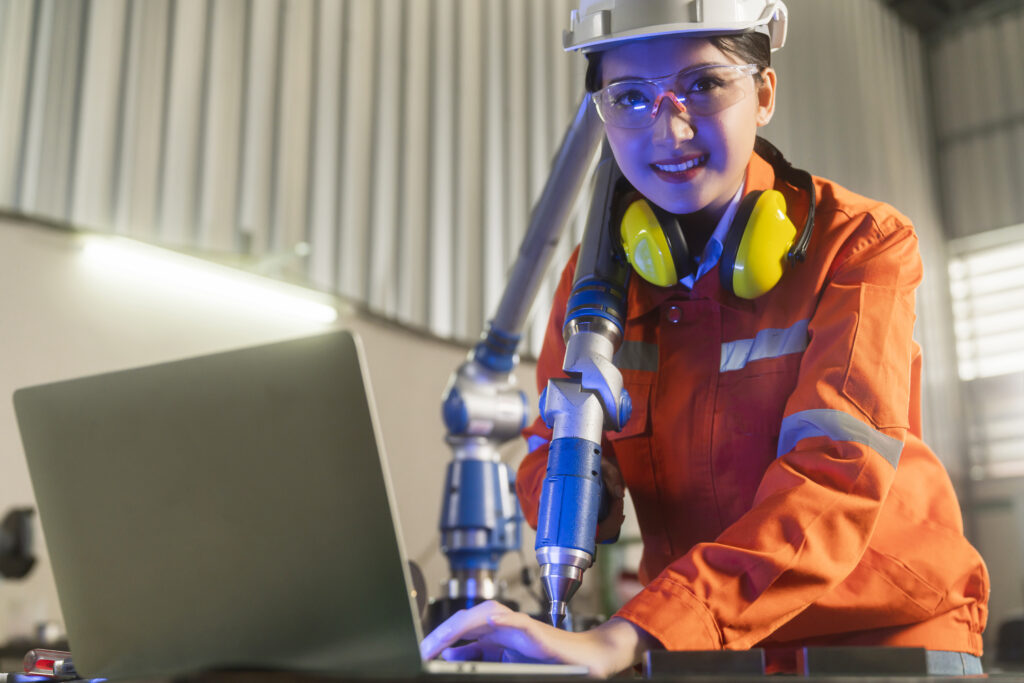The manufacturing sector is poised for a digital revolution, propelled by rapid technological advancements and the increasing necessity for skilled labor. As companies strive to remain competitive globally, adopting digital technologies becomes beneficial and essential. Among these technologies, e-learning emerges as a transformative tool, offering a scalable, flexible, and efficient method for upskilling employees and integrating digital practices into the manufacturing workflow.
This article delves into the role of e-learning as the cornerstone of digital transformation in manufacturing, highlighting its benefits, challenges, and the practical steps companies can take to implement e-learning strategies effectively.
Challenges of the Manufacturing Industry in the Era of Digital Transformation
The manufacturing sector, a cornerstone of the global economy, is undergoing a significant transformation driven by digital technologies. This digital era promises unprecedented efficiencies, innovative products, and new business models. However, the journey towards digital transformation has its challenges.
Skill Gap and Workforce Transformation
One of the most pressing challenges is the skill gap in the workforce. As manufacturing processes become more technologically advanced, there is a growing need for employees skilled in digital technologies such as artificial intelligence (AI), machine learning, and robotics. Deloitte’s 2024 manufacturing industry outlook highlights that nearly three-quarters of manufacturing executives cite attracting and retaining a quality workforce as their primary business challenge, emphasizing the necessity for digital skills.
source: deloitte.com/us/en/insights/industry/manufacturing/manufacturing-industry-outlook.html
Integration of Digital Technologies
Integrating digital technologies into existing manufacturing processes poses a technical and cultural challenge. According to KPMG’s Global Manufacturing Prospects 2023 report, CEOs focus on balancing investments in technology and people, highlighting the difficulty in seamlessly integrating new technologies while maintaining productivity and employee engagement.
source: kpmg.com/xx/en/home/insights/2023/01/global-manufacturing-prospects-2023.html
Sustainability and Regulatory Compliance
As the push towards sustainability intensifies, manufacturers are under pressure to reduce their environmental footprint and comply with increasingly stringent regulations. While necessary, the transition to more sustainable practices requires significant investment in new technologies and processes, posing a challenge for many firms.
Capital and Investment Constraints
Transitioning to a digitally enabled manufacturing environment requires substantial investment in new technologies and systems. However, economic uncertainties and the need for a clear return on investment can constrain capital allocation towards these initiatives, as highlighted by Euromonitor’s insights on navigating inflation and investment in digital innovation.
source: euromonitor.com/article/key-manufacturing-trends-in-2023
The digital transformation era in manufacturing marks both exciting opportunities and formidable challenges. Addressing these challenges requires a concerted effort from industry leaders, policymakers, and the workforce. By investing in skills development, sustainable practices, and digital technologies, the manufacturing sector can navigate the complexities of this new era and emerge stronger.
The journey towards digital transformation is about adopting new technologies and adapting to a rapidly changing global landscape, where agility, innovation, and resilience are the keys to success.

The Need for E-Learning in the Manufacturing Sector
The manufacturing sector is undergoing a significant transformation, driven by rapid technological advancements and shifting market demands. This evolution, often called the fourth industrial revolution or Industry 4.0, brings many benefits, including increased efficiency, improved product quality, and enhanced innovation.
However, it also presents several challenges, particularly in workforce development. There is a growing recognition of the need for e-learning in manufacturing to address these challenges. E-learning offers a flexible, scalable, and cost-effective way to upskill employees, ensuring they have the knowledge and skills needed to thrive in this new era.
The Digital Transformation Challenge
Digital transformation in manufacturing integrates digital technology into all business areas, fundamentally changing how companies operate and deliver value to customers. While it promises significant gains, it also requires a workforce that can manage and leverage these technologies effectively.
The rapid pace of technological change, an aging workforce, and a shortage of skilled workers have created a significant skills gap in the industry. The Manufacturing Institute and Deloitte projected that 2.4 million manufacturing jobs could go unfilled between 2018 and 2028 due to the skills gap, threatening the industry’s ability to grow and innovate.
The Role of E-Learning
E-learning can play a crucial role in closing this skills gap. It offers several advantages over traditional training methods, including:
- Accessibility: Learners can access training materials anytime, anywhere, making fitting learning into their schedules easier.
- Customization: E-learning platforms can offer personalized learning experiences, adapting to each employee’s pace and learning style.
- Scalability: E-learning can be easily scaled to accommodate increasing numbers of learners, making it a cost-effective solution for large organizations.
- Up-to-date Content: Digital learning materials can be updated quickly and efficiently to reflect the latest technological advancements and best practices.
Implementing E-Learning in Manufacturing Organizations
Implementing e-learning in the manufacturing sector requires careful planning and consideration. Companies must assess their training needs, identify the skills gaps, and determine the best platforms and tools to deliver e-learning effectively. This might involve investing in Learning Management Systems (LMS), developing custom e-learning modules, or partnering with e-learning providers that offer courses relevant to the manufacturing industry.
As the manufacturing sector continues to evolve, the need for e-learning will only grow. By investing in digital learning solutions, manufacturers can ensure their workforce is equipped with the necessary skills to navigate the challenges of the digital age, drive innovation, and maintain competitive advantage. E-learning is not just a temporary solution; it’s an essential component of a long-term workforce development strategy in the digital transformation era.

Benefits of E-Learning in Manufacturing Training
Integrating e-learning into the manufacturing sector represents a pivotal shift towards embracing digital transformation to address its evolving challenges. As the manufacturing landscape becomes increasingly complex, with rapid technological advancements and a growing need for a skilled workforce, e-learning emerges as a crucial tool to ensure that employees remain at the forefront of industry standards and innovations.
Accessibility and Flexibility
E-learning platforms offer unparalleled accessibility, allowing employees to engage with training materials anytime and from anywhere. This flexibility is particularly beneficial in manufacturing, where shift work is standard, and the opportunity for traditional classroom learning may be limited. E-learning enables workers to learn at their own pace, accommodating a wide range of learning styles and speeds, which can enhance the overall effectiveness of the training process.
Cost Efficiency
Traditional training methods in manufacturing are often costly, requiring physical materials, on-site instructors, and significant downtime as employees participate in training sessions. On the other hand, E-learning significantly reduces these expenses by offering online materials that can be reused and accessed by an unlimited number of employees without additional resources. This not only lowers the cost of training but also minimizes production disruptions, contributing to greater operational efficiency.
Updated and Consistent Training Material
The fast-paced nature of technological advancements in manufacturing necessitates constant updates to training materials to keep pace with new methods, machinery, and safety protocols. E-learning platforms facilitate easy and immediate updates to course content, ensuring that all employees have access to the most current information. This consistency in training helps maintain high quality and safety standards across the organization.
Scalability
As manufacturing companies grow and evolve, their training needs also expand. E-learning offers scalable solutions that can easily accommodate increases in workforce size without the logistical challenges associated with traditional training methods. Whether for onboarding new employees or upskilling the existing workforce, e-learning platforms can seamlessly scale to meet the organization’s changing needs.
Enhanced Learning Outcomes
E-learning in manufacturing leverages interactive content to enhance engagement and knowledge retention. This interactive approach makes learning more engaging and allows employees to practice and apply knowledge in virtual environments that closely mimic real-world scenarios. Such practical applications of knowledge can lead to better job performance and a deeper understanding of complex manufacturing processes.
Measurable Results
One of the critical advantages of e-learning is the ability to track and measure learning outcomes through analytics and reporting tools. This data-driven approach allows managers to identify areas where employees may need additional support, monitor progress toward training objectives, and assess the effectiveness of the training programs. Manufacturers can continuously improve their training strategies by leveraging these insights to maximize learning outcomes.
Adopting e-learning in the manufacturing sector offers a strategic approach to overcoming the challenges of skill development and knowledge transfer in an increasingly digital and competitive landscape. By providing flexible, cost-effective, and scalable training solutions, e-learning not only enhances the efficiency and effectiveness of workforce development but also supports the overall growth and innovation of the manufacturing industry. As manufacturers navigate the complexities of digital transformation, e-learning will undoubtedly play a critical role in shaping the future-ready workforce.
Implementing E-Learning in Manufacturing Companies
Implementing e-learning in the manufacturing sector is a strategic approach to addressing the growing demand for a skilled workforce capable of navigating the complexities of modern manufacturing environments. This transformation requires a shift in delivering educational content and necessitates a comprehensive strategy encompassing technology, content development, and organizational culture. Below, we outline a step-by-step guide to effectively implement e-learning in manufacturing, drawing insights from industry practices and educational technology trends.
Assess Training Needs
The first step is conducting a thorough needs assessment to identify your workforce’s skills and knowledge gaps. This involves understanding the manufacturing processes, technologies used, and the company’s future direction. The goal is to tailor the e-learning program to address current and future needs, ensuring that employees are well-equipped to contribute to the company’s growth and innovation efforts.
Choose the Right E-Learning Platform
Selecting an appropriate e-learning platform is crucial. The platform should be user-friendly and scalable to accommodate future growth. It should also support the types of content you plan to deliver and provide robust data analytics for tracking and assessing learner progress.
Develop Engaging Content
The effectiveness of e-learning heavily relies on the quality and relevance of its content. For manufacturing, content should be practical and directly applicable to daily tasks and challenges. Incorporating real-life scenarios can enhance engagement and knowledge retention. Collaboration with subject matter experts is essential to ensure the accuracy and relevance of training materials.

Train and Support Your Staff
Implementing e-learning is about more than just providing access to courses. It’s also essential to prepare and support your staff through this transition. This includes training on how to use the e-learning platform and creating a support system for technical issues. Encouraging a culture of continuous learning and making time for training within the work schedule are also crucial factors in successful implementation.
Integrate E-Learning into Career Development Plans
To maximize the impact of e-learning, integrate it into the broader context of employee career development plans. This approach aligns learning objectives with career progression, motivating employees to engage with e-learning content to achieve their professional goals.
Evaluate and Iterate
Finally, continuously evaluate the effectiveness of your e-learning program. This involves analyzing completion rates and assessment results and gathering feedback from employees. Use these insights to improve the content, delivery methods, and overall learning experience.
Successfully implementing e-learning in manufacturing requires careful planning, a focus on engaging content, and ongoing learner support. By following these steps, manufacturers can develop a skilled workforce capable of driving innovation and efficiency in the digital age.
Summary
E-learning is a pivotal catalyst for digital transformation within the manufacturing sector, providing a robust solution to skill gaps, technological integration, and continuous innovation. As this article has explored, adopting e-learning facilitates a seamless transition towards more digitally adept operations, offering accessibility, cost efficiency, and enhanced learning outcomes.
Despite the hurdles of implementing new technologies and fostering a culture of continuous improvement, the strategic deployment of e-learning initiatives can empower manufacturers to navigate and thrive in the digital landscape. By prioritizing the development of a skilled workforce through e-learning, the manufacturing industry can unlock unprecedented levels of efficiency, quality, and competitiveness.
Take advantage of the free demo and check how the e-learning platform can increase efficiency in your organization.











